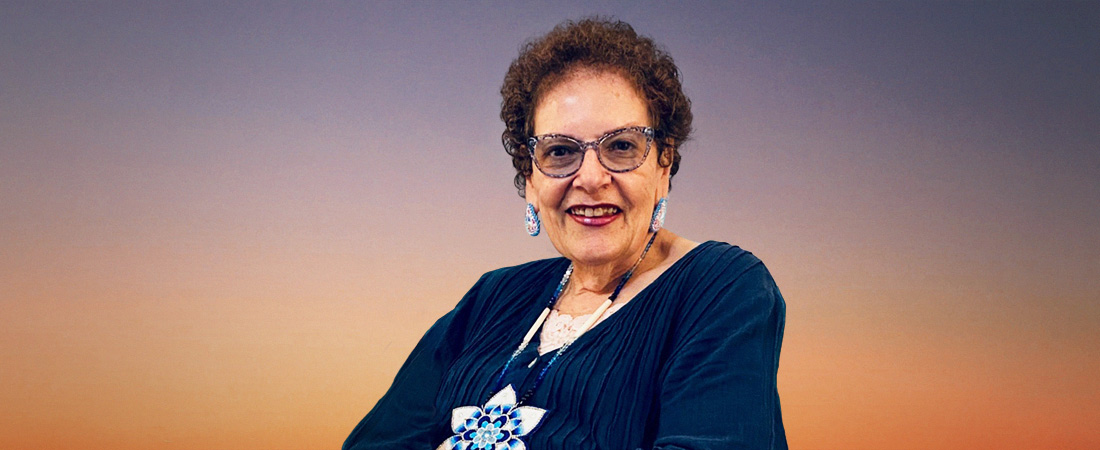EDC Honors Sadé Heart of the Hawk Ali, Suicide Prevention Advocate, Behavioral Health Expert, and Powerful Voice for Change

Sadé Heart of the Hawk Ali, Mi’kmaq First Nation from the Sturgeon Clan and the founding elder and medicine keeper of the New England States Two Spirit Society, passed away on November 12. A beloved EDC colleague and advisor, she devoted her career to ensuring that all people who need a therapist receive high-quality, culturally and linguistically responsive, and respectful treatment. She spoke from the heart at all times, and her words carried power and fueled change. She inspired all who met her.
In 2020, Sadé received the National Indian Health Board’s Innovations in Public Health Award and was the lead author of Best and Promising Practices for the Implementation of Zero Suicide in Indian Country. She was the Tribal Lead for the Zero Suicide Institute at EDC and served on the Suicide Prevention Resource Center’s Lived Experience Advisory Committee. A valued member of the LGBTQ+ Employee Resource Group of EDC’s Equity, Diversity, and Inclusion Committee, she was a leading voice in the conversation surrounding Two Spirit history, culture, and inclusion.
Sadé was an exceptionally skilled lecturer, trainer, and program leader. She drew on professional and lived expertise in her work, fostering resilience to address the intergenerational and historical trauma of Indigenous peoples. She was a passionate and effective advocate for actively engaging people from Indigenous communities in the design of interventions and policies meant to support them. In a 2018 interview with Suicide Prevention Australia, she noted:
“Our people have three times the national rate here in the United States of suicide completions and we need to be at the table when interventions are created, when policies are created, when people talk about us. I am a big believer in ‘Nothing about us without us.’ We need to be at the table. You can’t create an intervention for someone, especially of a different culture, without their input. And what I’ve found over the years working in the field—I’ve been working in behavioral health for 48 years—what I’ve found is that when folks don’t do well we tend to blame them instead of looking at ourselves and saying, ‘What could we have done differently?’ And so I think that if you are crafting an intervention for something as important as suicide prevention, you need to have everybody at the table that this is going to impact.”
Sadé served on the board of directors of SAIGE (Society of American Indian Government Employees) and was a lifelong member. She led a life that was deeply spiritual—she was a pow wow dancer and shawl maker—and dedicated to healing. At EDC, she was known for her integrity, intelligence, wisdom, clarity of vision and purpose, compassion, and delightful sense of humor.
For 51 years, Sadé worked in the behavioral health field, including serving as the deputy commissioner of Philadelphia’s Department of Behavioral Health and Intellectual disAbility Services. She taught at Brown University, Temple University, and Drexel University. For many years, she traveled the United States and Canada extensively providing culturally appropriate recovery management and resilience-promoting training in both the mental health and addictions fields.
A gifted writer, Sadé was one of the co-authors of the Philadelphia Behavioral Health Transformation Practice Guidelines for Recovery and Resilience Oriented Treatment, a framework for the fields of mental health and addictions treatment services that is used worldwide. She published Social Healing Words – Using Language to Promote Recovery and Resilience for Individuals, Families and Communities. In addition, she authored the following three moving posts for the EDC Innovations blog:
- Our Cultures Are Our Cure: Why the Restoration of Indigenous Languages Is So Important
- Getting to Zero in Indian Country
- Celebrating the Historical African-Indigenous Narrative
Sadé’s loss is deeply felt and mourned by the EDC community. Her invaluable contributions to health equity and her memory will live on forever.